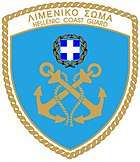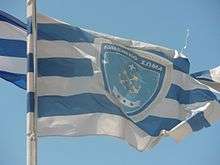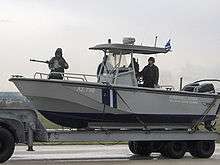Hellenic Coast Guard
The Hellenic Coast Guard (Greek Λιμενικό Σώμα-Ελληνική Ακτοφυλακή – Limeniko Soma-Elliniki Aktofylaki – lit. "Port Corps-Hellenic Coast Guard") is the national coast guard of Greece. Like many other coast guards, it is a paramilitary organization that can support the Hellenic Navy in wartime, but resides under separate civilian control in times of peace. It was founded in 1919 by an Act of Parliament (N. 1753/1919) and the legal framework for its function was reformed in 1927. The current name is specified in Law 3022/2011.
| Hellenic Coast Guard Λιμενικό Σώμα / Ελληνική Ακτοφυλακή | |
|---|---|
 Coat of Arms | |
 Racing stripe | |
| Agency overview | |
| Formed | 1919 |
| Employees | 8,000 |
| Jurisdictional structure | |
| Operations jurisdiction | Greece |
| Constituting instrument |
|
| Specialist jurisdiction |
|
| Agency executive |
|
| Parent agency | Ministry of Shipping and Island Policy |
| Facilities | |
| Boats | 240 vessels |
| Fixed wing aircraft |
|
| Helicopters |
|
| Notables | |
| Person |
|
| Website | |
| www | |
| Colors : Cyan, White & Gold | |
Organization

The Hellenic Coast Guard Force is currently under the authority of the Ministry of Shipping and Island Policy. The Hellenic Coast Guard Force is headed by the Senior Coast Guard Officer who has the rank of vice admiral (Antinavarchos).
The basic roles of the Hellenic Coast Guard are law enforcement at sea, search and rescue, marine safety, preventing sea pollution, fisheries patrolling, preventing illegal immigration and drug interdiction.
In order to perform these roles, the Coast Guard operate a number of patrol boats of various sizes (6m to 60m) and different types (RIBs, coastal patrol boats, offshore patrol boats, lifeboats and pollution control vessels). On land the Hellenic Coast Guard is equipped with cars and motorcycles.
The Hellenic Coast Guard operates the Maritime Rescue Coordination Center (MRCC) in Piraeus and the Emergency Radio Communications Station SXE at Aspropyrgos (38°02′12.5″N 23°35′7.5″E). The Hellenic Coast Guard also operates the Vessel Traffic Service (V.T.M.I.S.) at busy sea lanes, currently around the ports of Piraeus, Elefsis, Lavrion and Rafina.
Between May 21, 1964 and 1980 the Hellenic Coast Guard had its own special flag, which was derived from the Greek Ensign with the addition of the crossed anchors badge on the center of the white cross.[1]
Role and responsibilities
The main activities of the Hellenic Coast Guard are defined in the present legislation and specified within its institutional framework of operation. These activities are the following:
- Law enforcement at sea, ports and coastal areas. Prevention of illegal immigration. Surveillance of the sea, shipping, ports and borders.
- Search and rescue at sea (jointly with the Hellenic Air Force, which is responsible for search and rescue by air).
- Safety of navigation (with the exception of lighthouses, racons and buoys, which are constructed, purchased, installed and maintained by the Hellenic Navy Lighthouse Service).
- Protection of the marine environment and response to marine pollution incidents.
- Provision of emergency maritime radio communication services.[2]
- Port operations (excluding port pilots service).
- Representation of Greece in international organizations and the European Commission in matters related to these roles.
Personnel
Most officers in recent years are graduates from higher education establishments, including the Merchant Marine Academies. After recruitment new officers study for four years at the Hellenic Naval Academy. Petty officers are trained for two years at Palaskas Naval Training Centre and lower rank enlisted men are trained at Scholi Limenofylakon at Piraeus, for a duration of two years. With law Law 4029 of 2011, a volunteer Auxiliary Coast Guard was established.[3] The Officers of the Hellenic Coast Guard have the same ranks as the Officers of the Hellenic Navy and similar insignia, replacing the curl with two crossed anchors. The Petty Officers (Ratings) also use rank insignia similar to those of the Hellenic Navy, replacing the speciality symbol with the crossed anchors badge.[4]
Ranks and Insignia
| Officer Grade Structure of the Hellenic Coast Guard | ||||||||||
|---|---|---|---|---|---|---|---|---|---|---|
| OF-9 | OF-8 | OF-7 | OF-6 | OF-5 | OF-4 | OF-3 | OF-2 | OF-1 | ||
| (no equivalent) | Αντιναύαρχος Antinavarchos (Vice Admiral) |
Υποναύαρχος Yponavarchos (Rear Admiral) |
Αρχιπλοίαρχος Archiploiarchos (Commodore) |
Πλοίαρχος Ploiarchos (Captain) |
Αντιπλοίαρχος Antiploiarchos (Commander) |
Πλωτάρχης Plotarchis (Lt. Commander) |
Υποπλοίαρχος Ypoploiarchos (Lieutenant) |
Ανθυποπλοίαρχος Anthypoploiarchos (Lieutenant junior grade) |
Σημαιοφόρος Simaioforos (Ensign) | |
| (no equivalent) |  |
 |
 |
 |
 |
 |
 |
 |
 | |
| NCO Rank Structure of the Hellenic Coast Guard | ||||||||
|---|---|---|---|---|---|---|---|---|
| OR-9 | OR-8 | OR-7 | OR-6 | OR-5 | OR-4 | OR-3 | OR-2 | OR-1 |
| Ανθυπασπιστής Anthipaspistis (Fleet Chief Petty Officer) |
Αρχικελευστής Archikelefstis (Chief Petty Officer) |
Επικελευστής Epikelefstis (Petty Officer) |
Κελευστής Kelefstis (Leading seaman) |
Λιμενοφύλακας Limenofylakas (Seaman) |
||||
 |
 |
 |
 |
 |
||||
Fleet
As of 2015, the structure of the Hellenic Coast Guard predicts a fleet consisting of five Offshore Patrol Vessels (OPVs) sized 45–60 metres in length and of 300-450 tonnes displacement, six to twelve Patrol boats with lengths of 25–30 metres and more than fifty Coastal Patrol Vessels of various types with lengths of 14–20 metres.[5][6] In addition the Hellenic Coast Guard operates a large number of fast Rigid-Inflatable Boat (RIB)/Special Forces vessels as well as eleven Lifeboats. Currently the Hellenic Coast Guard fleet in its totality consists of approximately 240 vessels of all types.
| Model & Class | Photo | Type | Length (m) | Displacement (tonnes) | Origin | In service | Notes |
|---|---|---|---|---|---|---|---|
| Sa'ar 4.5 |  Saar IV class Open sea patrol boat PLS-060 (ΛΣ-060), SY4138, under way in Saronikos Bay. | OPV | 58 | 450 | 3[7] | Vessels ΛΣ-060, ΛΣ-070 and ΛΣ-080 are weapon-downsized/modified FACs, each fitted with an OTO Breda 30mm/70 gun as main armament and two remote controlled 0.50" heavy machine guns but without anti-ship missiles. Speed of 34.5 knots. | |
| Stan Patrol 5509 |  HCG Gavdos (LS090). Credit: Jens Boldt at http://www.shipspotting.com/ | OPV | 58,5 | 700 | 1 | Vessel ΛΣ-090, built by Damen shipyards and delivered in October 2015. Weapon systems of choice to be installed are still unspecified. Speed of 27-30 knots. | |
| Vosper Europatrol 250 Mk1 | OPV | 47.3 | 300 | 1 | Vessel ΛΣ-050 underwent significant maintenance and repairs and entered active service again following donations from the private sector.[8] The boat can be armed with 40mm gun as main weapon system. Speed of 40 knots. | ||
| Class Dilos (Δήλος) |  Patrol boat ΛΣ-015 of Dilos class in port in Crete. | Patrol | 29 | 86 | 6 | Vessels ΛΣ-010, ΛΣ-015, ΛΣ-020, ΛΣ-025, ΛΣ-030 and ΛΣ-040, all six boats are currently under consideration for decommissioning following extensive service; design by Abeking & Rasmussen built by ENAE shipyards. Speed of 27 knots. | |
| Class Faiakas (Φαίακας) | Patrol | 24.6 | 2 | Vessels ΛΣ-617 and ΛΣ-618 have been delivered. The remaining four (4) boats (type POB-24G) of the initial order[9] will not be delivered following legal action of HCG against the manufacturer. Vessel ΛΣ-618 is equipped with an EMILY robotic SAR device. Each of the boats of the class will bear a .50" heavy machine gun. Speed of 32 knots. | |||
| CB-90HCG | Coastal Patrol / Combat | 15.9 | 20 | 3[7] | Vessels ΛΣ-134 to ΛΣ-136. All are combat boats, each armed with two twin remote controlled 0.50" heavy machine guns and carry level IV armor plates. Speed of 40-45 knots. | ||
| Javelin-74 | Coastal Patrol | 19.2 | 27 | 3 | Vessels ΛΣ-192, ΛΣ-193 and ΛΣ-194 Speed of 50+ knots. | ||
| LCS-57 (Lambro-57) Mk.I |  Coastal patrol boat ΛΣ-608 LCS-57 (Lambro-57) Mk.I. | Coastal Patrol | 18.2 | 28 | 19 | Vessels ΛΣ-137 to ΛΣ-151 and ΛΣ-169 to ΛΣ-172. Speed of 44 knots. | |
| LCS-57 (Lambro-57) Mk.II | Coastal Patrol | 19.2 | 27 | 16 | Vessels ΛΣ-601 to ΛΣ-616. Speed of 50+ knots. | ||
| LCS-53 (Lambro-53 Guardian) | Coastal Patrol | 16.8 | 21 | 12 | Vessels ΛΣ-114 to ΛΣ-126. Speed of 33 knots. | ||
| Olympic L65/74 | Coastal Patrol | 23 | 4 | ΛΣ-102 series | |||
| Olympic L-44 | Coastal Patrol | 14 | 25 | 3 | ΛΣ-153 series | ||
| D-45 | Coastal Patrol | 13.9 | 25 | 4 | |||
| D-45M | Coastal Patrol | 13.9 | 25 | 5 | |||
| Arun Halmatic | Lifeboat | 16 | 37 | 1 | Vessel SAR-510 | ||
| Lambro Halmatic 60 | Lifeboat | 18 | 37 | 10 | Vessels' series SAR-511 to SAR-520. | ||
| System 33/Nemesis RIB[10] | RIB Coastal Patrol | 10.35 | 10 | All vessels are donation by SNF having speed of 50+ knots. | |||
| MIL-38 | Coastal Patrol | 11.85 | 7 | 2 | Vessels ΛΣ-129 and ΛΣ-130. Speed of 50-55 knots. | ||
| MIL-40 | Coastal Patrol | 13 | 7 | 2 | Vessels ΛΣ-132 and ΛΣ-133. Speed of 50-55 knots. | ||
| Madera MRCD-1250 | RIB Special Forces | 12,5 | 2 | Military grade boats for HCG's special forces, able to carry 10-12 troops each. Armed with 0.50" gun and two 7.62mm machine guns. Speed of 49 knots. | |||
| Magna 110 Hurricane Mk.I/II | RIB Coastal Patrol | 10,8 | 2 | ||||
| Magna Onda | Coastal Patrol | 11.7 | 5.4 | 2 | |||
| Super Onda | Coastal Patrol | 8.6 | 2.8 | 2 | |||
| Magna 31 | RIB Coastal Patrol | 8.6 | 2.8 | 3 | One (1) donated at 2014 by Dmitry Rybolovlev | ||
| Oceanic Interceptor | RIB Coastal Patrol | ? | |||||
| Gibli-1025 | RIB Coastal Patrol | 10,25 | 12 | ||||
| Oceanic 9000 Stealth | RIB Coastal Patrol | 9 | 2 | 18 | |||
| Mostro Top Gun 864/964 | RIB Coastal Patrol | 9.3/9.9 | 1.4/1.6 | 19 | |||
| Boston Whaler |  Boston Whaler ΛΣ-798 patrol craft towed for a parade. | Coastal patrol, Diver support | 9 | 3 | ΛΣ-798. Donated by the USCG in 2004.[11] | ||
| Halter Marine HSB | Coastal patrol, Diver support | 1 | Donated by the USCG in 2004 | ||||
| Wellcraft | Coastal patrol, Diver support | 1 | Donated by the USCG in 2004 | ||||
| LS-413 (LMPA) | Pollution control | 29 | 240 | 3 | by Astilleros Gondan, Spain.[12][13] | ||
| Pollcat | Pollution control | 18.5 | 85 | 3 | |||
Aircraft fleet
The Hellenic Coast Guard operates a small fleet of fixed wing aircraft based at Tatoi (Dekelia) Air Base, (LGTT, 38°06′35.1″N 23°46′55.5″E). Its four AS 332 Super Puma Search and Rescue (SAR) helicopters are operated by the Hellenic Air Force 384 Squadron, based at Elefsis Air Base (LGEL), with mixed Air Force and Coast Guard crews.
| Aircraft | Photo | ID | Type | Versions | Origin | In service[14] | Notes |
|---|---|---|---|---|---|---|---|
| Eurocopter Super Puma |  Combat SAR Super Puma at the open day at Tatoi-Dekelia AFB. | SAR helicopter | AS 332C | 4[7] | Operated by the Hellenic Air Force | ||
| Eurocopter AS365 Dauphin | HC-31 to HC-36 | Patrol helicopter | AS 365N3 | 6[7] | Based at Kotroni Naval Air Station (LGKN) in cooperation with Hellenic Navy | ||
| Cessna 406 Caravan II | Reims Cessna F-406 aircraft of the Hellenic Coast Guard | AC-21 to AC-23 | Maritime patrol | F406 | 3[7] | Built by Reims | |
| Cessna 172 Skyhawk | AC-1, AC-2 | Utility aircraft | 172RG | 2[7] | |||
| Socata TB |  Socata TB-20 Trinidad single engine aircraft AC-3 of the Hellenic CG at Dekelia Air Base. | AC-3, AC-4 | Utility aircraft | TB 20 | 2[7] |
HCG facilities
- New headquarters and VTMIS operations centre: 37°56′33″N 23°37′35″E
- Old headquarters and SAR coordination centre: 37°56′23.5″N 23°38′55″E
- Mooring for Open Sea Patrol Vessels (Keratsini): 37°57′25.7″N 23°36′39.7″E
- Coast Guard apron at Tatoi Air Base: 38°06′35.1″N 23°46′55.5″E
- Aspropyrgos Maritime Communications Radio Station SXE: 38°02′12.5″N 23°35′7.5″E
- Piraeus Central Port Authority: 37°56′23″N 23°38′24″E
- Enlisted men training facility (Σχολή Λιμενοφυλάκων): 37°56′10.3″N 23°37′40.4″E
- Piraeus VTMIS AIS receiver 002393200 37°56.369′N 023°38.381′E
- Psyttaleia Island VTMIS AIS receiver 002391100 37°56.620′N 23°35.664′E
- Patras VTS 38.24617°N 21.72886°E
- Thessaloniki VTS 40.63802°N 22.92522°E
- Corfu Island VTS 39.62708°N 19.90554°E
- Igoumenitsa VTS 39.48799°N 20.25899°E
- Lavrion VTS 37.71394°N 24.06252°E
- Rafina Port 38°01.347′N 24°0.522′E
References
- "Photo of old Hellenic CG flag". Archived from the original on 3 October 2008. Retrieved 4 July 2017.
- "Greece, Coast Radio Stations, Hellenic Coast Guard MRCC and MRSC" (PDF). The United Kingdom Hydrographic Office. 2002. Archived from the original (PDF) on 2008-10-03. Retrieved 2008-07-02.
- Law 4029, Government Gazette A 245, 2011-11-22
- "Grade/rank insignia of the Hellenic CG (Ministry of Merchant Marine)". Archived from the original on 3 October 2008. Retrieved 4 July 2017.
- "Ο Στόλος του Λιμενικού Σώματος /Ελληνικής Ακτοφυλακής το 2015". Retrieved 28 August 2015.
- http://www.yen.gr/wide/yen.chtm?prnbr=24177 Archived 2010-12-02 at the Wayback Machine
- E. Pagotsis, ed. (May 2011). Ετήσια Ανασκόπηση Ισορροπία Δυνάμεων 2011-2012 (Annual Review Balance of Power 2011-2012. Athens, Greece: Dyros Ltd. p. 77.
- "Τελετή Απόδοσης σε Ενέργεια του Πλοίου Ανοιχτής Θαλάσσης Λιμενικού Σώματος (ΠΑΘ/ΛΣ)050". Retrieved December 2015. Check date values in:
|accessdate=(help) - "Greek coastguard orders six coastal patrol craft". janes.com. 29 April 2014. Retrieved 13 May 2014.
- "ELMON - DEFENCE SYSTEMS". www.elmon.com. Retrieved 4 July 2017.
- "We're sorry, that page can't be found". www.state.gov. Retrieved 4 July 2017.
- "Antipollution vessel ALPHA" (PDF). Astilleros Gondan shipbuilders. 1994.
- "Astilleros Gondan Alfa". Astilleros Gondan shipbuilders. 2011.
- "World Military Aircraft Inventory", Aerospace Source Book 2007, Aviation Week & Space Technology, January 15, 2007.
External links
| Wikimedia Commons has media related to Hellenic Coast Guard. |
- Hellenic Coast Guard official website
- International Lifeboat Federation
- "Insignia of HCG Officers and Petty Officers". Ministry of Merchant Marine. Archived from the original (JPEG) on 2008-10-03. Retrieved 2008-08-11.


